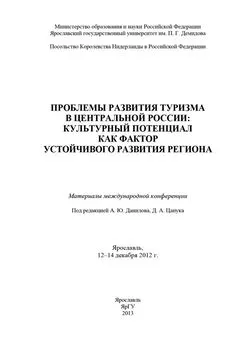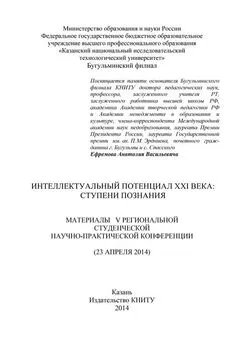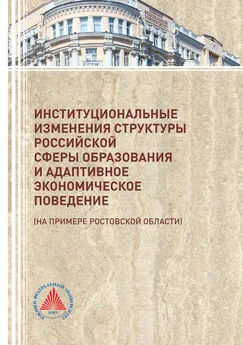Коллектив авторов - Личностный потенциал. Структура и диагностика
- Название:Личностный потенциал. Структура и диагностика
- Автор:
- Жанр:
- Издательство:Смысл
- Год:2011
- Город:Москва
- ISBN:978-5-89357-28
- Рейтинг:
- Избранное:Добавить в избранное
-
Отзывы:
-
Ваша оценка:
Коллектив авторов - Личностный потенциал. Структура и диагностика краткое содержание
Коллективная монография охватывает широкий круг вопросов психологии личности через призму новой концепции личностного потенциала – системы характеристик личности, лежащих в основе успешной саморегуляции в различных сферах жизнедеятельности.
Адресуется психологам.
Личностный потенциал. Структура и диагностика - читать онлайн бесплатно ознакомительный отрывок
Интервал:
Закладка:
Аракелов Г.Г. Национальный проект «Здоровье» и психическое здоровье населения России // Психология перед вызовом будущего. Материалы научной конференции, приуроченной к 40-летнему юбилею факультета психологии МГУ. М.: Изд-во Моск. ун-та, 2006. С. 5–6.
Батурин Н.А., Циринг Д.А. Методика диагностики стиля атрибуции детей // Теоретическая, экспериментальная и прикладная психология: Сб. научных трудов / Под ред. Н.А. Батурина. Челябинск: Изд-во ЮУрГУ, 2000. Т. 2. С. 105–116.
Бек Дж. Когнитивная терапия: полное руководство. М.: Вильямс; Диалектика, 2006.
Бек А., Раш Ф., Шо Б., Эмери Г. Когнитивная терапия депрессии. СПб.: Питер, 2003.
Бонивелл И. Ключи к благополучию: Что может позитивная психология / Пер. с англ. М.: Время, 2009.
Голованиевская М.К. Французский менталитет с точки зрения носителя русского языка. М., 1997.
Гордеева Т.О . Психология мотивации достижения. М.: Смысл; Академия, 2006.
Гордеева Т.О. Оптимистическое мышление личности как составляющая личностного потенциала // Психол. диагностика. 2007. Т. 1. С. 32–65.
Гордеева Т. О., Осин Е.Н. Позитивное мышление как фактор учебных достижений // Вопр. психол. 2010. № 1. С. 24–33.
Гордеева Т.О., Осин Е.Н., Шевяхова В.Ю. Диагностика оптимизма как стиля объяснения успехов и неудач: опросник СТОУН. М.: Смысл, 2009.
Гордеева Т.О., Сычев О.А., Осин Е.Н. Разработка русскоязычной версии Теста диспозиционного оптимизма (LOT) // Психол. диагностика. 2010. № 2. C. 36—64
Джидарьян И.А. Счастье и удовлетворенность жизнью в русском обществе // Российский менталитет: Вопросы психологической теории и практики. М., 1997. С. 187–223.
Джидарьян И.А. Представления о счастье в российском менталитете. СПб.: Алетейя, 2001.
Замышляева М.С . Оптимизм и пессимизм в совладающем поведении в юношеском возрасте: Дис. … канд. психол. наук. М., 2006.
Зелигман М . Как научиться оптимизму. М.: Вече; Персей, 1997.
Крылова О.В. Разработка русскоязычной версии детского опросника атрибутивного стиля: Дипломная работа. Ф-т психол. МГУ, 2002.
Мак-Маллин Р. Практикум по когнитивной терапии. СПб.: Речь, 2001.
Мечников И.И. Этюды оптимизма. М.: Наука, 1988.
Муздыбаев К. Оптимизм и пессимизм личности // Соц. исследования. 2003. Т. 12. С. 87–96.
Рудина Л.М. Тест на оптимизм. Метод определения атрибутивных стилей: Метод. пособие / Под ред. В.М. Русалова. М.: Наука, 2002.
Селигман М.П. Новая позитивная психология. М.: София, 2006.
Стефаненко Т.Г. Этнопсихология. М.: Аспект-Пресс, 2004.
Столц П.Г. Показатель стойкости: как обратить препятствия в новые возможности. Минск: Попурри, 2003.
Сычев О.А. Психология оптимизма. Учебно-методическое пособие. Бийск: БПГУ им. В.М. Шукшина, 2008.
Тер-Минасова С.Г. Язык и межкультурная коммуникация. М.: Изд-во Моск. ун-та, 2004.
Фрэнкин Р. Мотивация поведения: биологические, когнитивные и социальные аспекты. СПб.: Питер, 2003.
Эллис А. Психотренинг по методу Альберта Эллиса. СПб.: Питер, 1999.Abramson L.Y., Seligman M.E.P., Teasdale J.D. Learned helplessness in humans // Journal of Abnormal Psychology. 1978. Vol. 87. P. 49–74.
Abramson L.Y., Metalsky G.I., Alloy L.B. Hopelessness depression: A theory-based subtype of depression // Psychological Review. 1989. Vol. 96. P. 358–372.
Abramson L.Y., Dykman B.M., Needles D.J. Attributional style and theory: Let no one tear them asunder // Psychological Inquiry. 1991. Vol. 2 (1). P. 11–49.
Alloy L.B., Kelly K.A., Mineka S., Clements C.M. Comorbidity and depressive disorders: A helplessness-hopelessness perspective // Comorbidity of mood and anxiety disorders / J.D. Maser, R. Cloninger (Eds.). – Washington (DC): American Psychiatric Press, 1990.
Ashforth B.E., Fugate M. Attributional style in work settings: development of a measure // Journal of Leadership & Organizational Studies. 2006. Vol. 12. 3. P. 12–29.
Aspinwall L.G., Taylor S.E. Modeling cognitive adaptation: A longitudinal investigation of the impact of individual differences and coping on college adjustment and performance // Journal of Personality and Social Psychology. 1992. Vol. 63. P. 989—1003.
Assad K.K, Donnellan B.M., Conger R.D. Optimism: an enduring resource for romantic relationships // Journal of Personality and Social Psychology. 2007. Vol. 93. № 2. P. 285–297.
Balatsky G., Diener E. Subjective well-being among Russian students // Social Indicators Research. 1993. Vol. 28. P. 225–243.
Bradbury T.N., Fincham F.D. Attributions in marriage: Review and critique // Psychological Bulletin. 1990. № 107. P. 3—33.
Bradbury T.N., Beach S.R.H., Fincham F.D., Nelson G.M. Attributions and behavior in functional and dysfunctional marriages // Journal of Consulting and Clinical Psychology. 1996. Vol. 64. P. 569–576.
Brief D.E., Comrey A.L. A Profile of Personality for a Russian Sample: As indicated by the Comrey Personality Scales // Journal of Personality Assessment. 1993. Vol. 60 (2). P. 267–284.
Bridges K.R. Using attributional style to predict academic performance: How does it compare to traditional methods? // Personality and Individual Differences. 2001. Vol. 31 (5). P. 723–730.
Brissette I., Scheier M.F ., Carver C.S. The role of optimism and social network development, coping, and psychological adjustment during a life transition // Journal of Personality and Social Psychology. 2002. Vol. 82. P. 102–111.
Buchanan G.M., Seligman M.E.P. (Eds.). Explanatory Style. Hillsdale (NJ): Erlbaum, 1995.
Burns M.O., Seligman M.E.P. Explanatory style Across the Life Span: Evidence for Stability Over 52 Years // Journal of Personality and Social psychology. 1989. Vol. 56. № 3. P. 471–477.
Caprara G.V., Steca P . Affective and social self-regulatory efficacy beliefs as Determinants of positive thinking and happiness // European Psychologist. 2005. Vol. 10 (4). P. 275–286.
Caprara G.V., Steca P . Affective and interpersonal self-regulatory efficacy beliefs as determinants of subjective well-being // Dimensions of well-being. Research and intervention / A. Delle Fave (Ed.). Milano: Franco Angeli, 2006. P. 120–142.
Carver C.S., Gaines J.G. Optimism, pessimism, and postpartum depression // Cognitive Therapy and Research. 1987. Vol. 11. P. 449–462.
Carver C. S., Scheier M. F. Attention and self-regulation: a control– theory approach to human behavior. N.Y.: Springer-Verlag, 1981.
Carver C. S., Scheier M. F. Unresolved issues regarding the meaning and measurement of explanatory style // Psychological Inquiry. 1991. Vol. 2. P. 21–24.
Chang E.C., Maydeu-Olivares A., D’Zurilla T. J. Optimism and pessimism as partially independent constructs: Relationship to positive and negative affectivity and psychological well-being // Personality and Individual Differences. 1997. Vol. 23. P. 433–440.
Chemers M.M., Hu L., Garcia B.F. Academic self-efficacy and first-year college student performance and adjustment // Journal of Educational Psychology. 2001. Vol. 93. № 1. P. 55–64.
Cheng H., Furnham A. Attributional style and personality as predictors of happiness and mental health // Journal of Happiness Studies. 2001. № 2. P. 307–323.
Cheng H., Furnham A. Attributional style and self-esteem as predictors of psychological well being // Counselling Psychology Quarterly. 2003. Vol. 16. № 2. P. 121–130.
Corr P.J., Gray J.A. Attributional style as a personality factor in insurance sales performance in the UK // Journal of Occupational and Organizational Psychology. 1996. № 69. P. 83–87.
Davis H., Zaichkowski L. Explanatory style among elite jockey athletes // Perceptual and Motor Skills. 1998. Vol. 87. P. 1075–1080.
Dember W.N., Brooks J. A new instrument for measuring optimism and pessimism: Test– retest reliability and relations with happiness and religious commitment // Bulletin of Psychonomic Society. 1989. Vol. 27. P. 365–366.
Diener E., Lucas R.E., Scollon C.N. Beyond the hedonic treadmill: revising the adaptation theory of well-being // American Psychologist. 2006. Vol. 61. P. 305–314.
Dweck C.S., Davidson W., Nelson S., Enna B. Sex differences in learned helplessness: (II) The contingencies of evaluative feedback in the classroom and (III) An experimental analysis // Developmental Psychology. 1978. Vol. 14. P. 268–276.
Ey S . A new measure of children’s optimism and pessimism: the youth life orientation test // Journal of Child Psychology and Psychiatry. 2005. Vol. 46. № 5. P. 548–558.
Fibel B., Hale W.D. A generalized expectancy for success scale – a new measure // Journal of Consulting and Clinical Psychology. 1978. Vol. 46. P. 924–931.
Fincham F.D. Optimism and the family // The science of optimism and hope: research essays in honor of Martin E.P. Seligman / J.E. Gillham (Ed.). Philadelphia; L.: Templeton foundation press, 2000. P. 271–298.
Fincham F.D., Beach S.R.H., Arias I., Brody G.H. Children’s attributions in the family: the children’s relationship attribution measure // Journal of Family Psychology. 1998. Vol. 12. 4. P. 481–493.
Fincham F.D., Bradbury T.N. Assessing attributions in marriage: The relationship attribution measure // Jounal of Personality and Social Psychology. 1992. Vol. 62 (3). P. 457–468.
Читать дальшеИнтервал:
Закладка:










